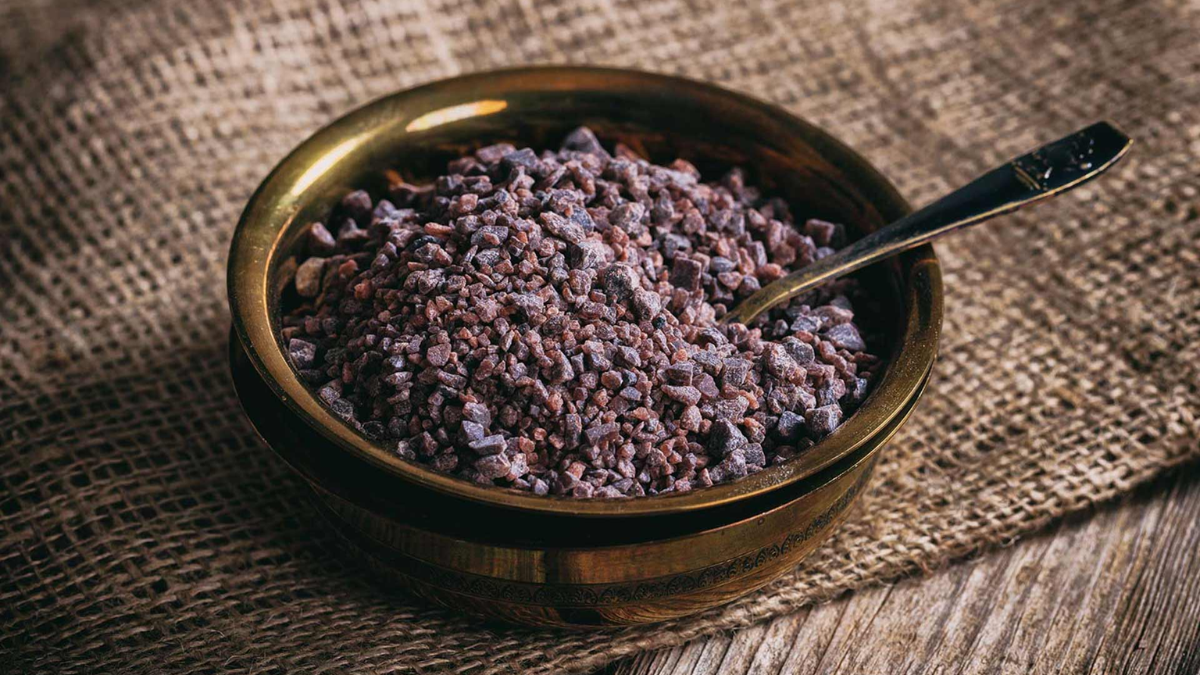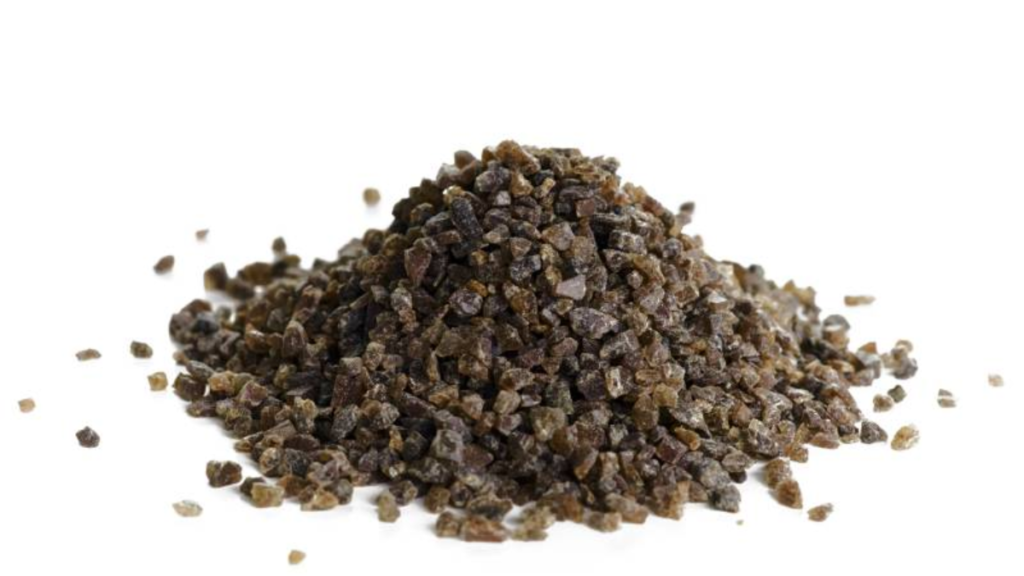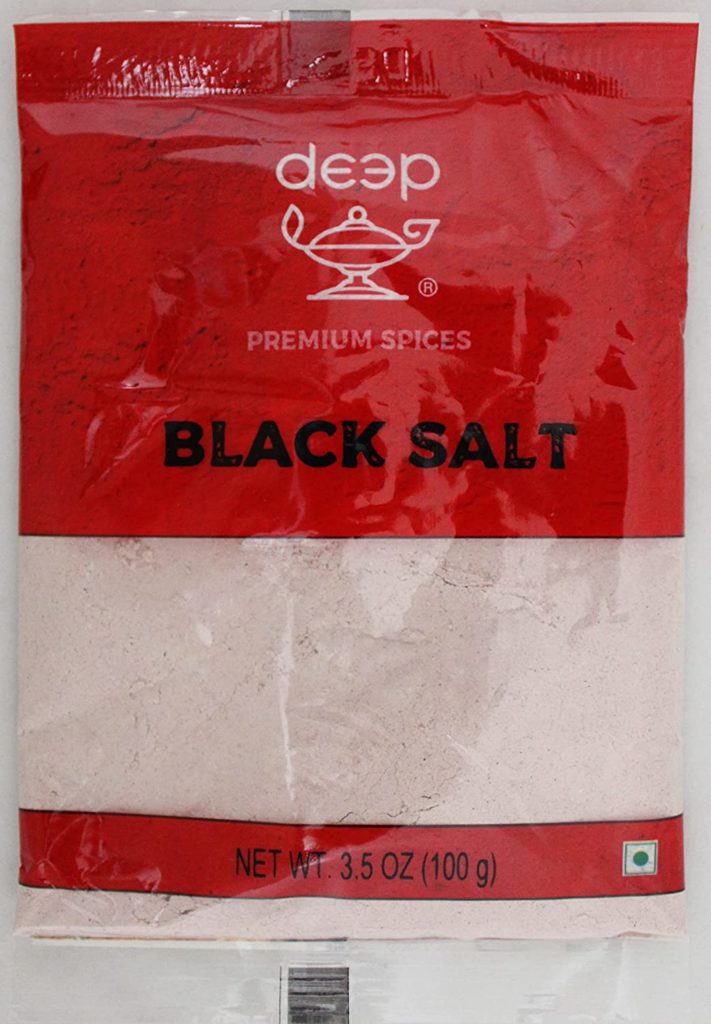Black Salt originates in India, also known as Kala namak or Himalayan black salt. It is obtained from salt mines in the Himalayan countries of Bangladesh, Pakistan, India, and Nepal. Black salt was first used in Ayurvedic medicine because of its all-encompassing medicinal properties. It contains many insoluble minerals, which the body finds more challenging to assimilate. Today, black salt is common in cooking, particularly in Indian food. The sulfur compounds that make up its volcanic origins give it its aroma and flavor. Additionally, it contains potassium chloride and iron.
What is Black Salt?
Himalayan salt is processed to make black salt. It’s also referred to as Kala namak, Indian black salt, or Himalayan black salt. Asian cuisine uses it most commonly. It should not be confused with black lava salt or Hawaiian black salt, both mixtures of sea salt and activated charcoal.
Pink salt is first transformed into black salt in India by heating it with hard seeds and other Indian spices, seeds, and herbs. Black salt gets its name from the deeper color that results from heating. However, in reality, it can seem anywhere from brown to pink and purple, usually with a little pink tint when ground.
Black salt can enhance the flavor and authenticity of Asian and, more specifically, Indian cuisine. However, the flavor advantages of black salt aren’t just applicable to ethnic food. It can enhance the flavor of any food when used in place of ordinary salt.
Black Salt Nutrition Facts
| Nutrient | Amount per 100g | % Daily Value* |
| Calories | 18 kcal | 1% |
| Total Fat | 0.20 g | 0% |
| Saturated Fat | 0.08 g | 0% |
| Trans Fat | 0 g | |
| Cholesterol | 0 mg | 0% |
| Sodium | 37,000 mg | 1542% |
| Total Carbohydrate | 4.10 g | 1% |
| Dietary Fiber | 0.40 g | 2% |
| Total Sugars | 0.20 g | |
| Protein | 0.60 g | 1% |
| Vitamin D | 0 mcg | 0% |
| Calcium | 2450 mg | 245% |
| Iron | 32.89 mg | 183% |
| Potassium | 300 mg | 6% |
| Magnesium | 150 mg | 36% |
*Percent Daily Values are based on a 2,000-calorie diet. Your daily values may be higher or lower depending on your calorie needs.
Health Benefits of Black Salt
Black salt offers unexpectedly low sodium levels and antioxidant qualities. Additionally, it has crucial elements like iron, calcium, and magnesium that are necessary for healthy bodies.
Reduces Bloating and Heartburn
A dash of salt can lessen gas production and bloat, and flatulence. Black salt aids in reducing bloating and heartburn by encouraging the liver to produce more bile. It limits acid production and lessens reflux.,
Digestion
Black salt enhances digestion by boosting the stomach’s natural production of acid and the liver’s synthesis of bile juice. Additionally, it aids in enhancing nutrition absorption in the small intestine. Black salt can assist your liver produce bile and enhance the body’s absorption of fat-soluble vitamins in the small intestine if you have digestive problems. Numerous things, such as overeating, allergies, constipation, inflammatory bowel syndrome, etc., can lead to bloating. The alkaline properties of black salt help to balance out too much stomach acid. The minerals it contains aid in minimizing the harm done by acid reflux.
Reference: Black Pepper and its Pungent Principle-Piperine: A Review of Diverse Physiological Effects
Heart Wellness
Black salt has a reducing property known as ama, which are harmful byproducts of incomplete food digestion in the stomach. This ingredient lowers cholesterol.
By serving as a natural blood thinner, it also controls blood pressure. Doctors advise consuming little more than 6 grams daily because exceeding this can increase blood pressure. Do not take more than 3.75 grams daily if you have high blood pressure.
Lessons Complications of Diabetes
Blood glucose levels can be slightly lowered with the use of black salt. Additionally, black salt can lower high blood pressure in little doses. Consuming black salt regularly, which is heavy in sodium, helps the body produce insulin, which helps control blood sugar levels. Studies have demonstrated a relationship between low salt levels and a reduction in the body’s ability to release insulin.
The pancreas produces the hormone insulin, which is in charge of regulating blood sugar levels. A person is deemed to have diabetes when their body is either unable to produce enough insulin or has grown resistant to it.
Muscle Spasms are Reduced
Black salt contains a sizable amount of potassium, which is necessary for your muscles to function properly and reduces muscle spasms. The high potassium content of black salt is crucial for maintaining healthy muscles. Additionally, it facilitates the uptake of other minerals. Thus, by calming the muscles, black salt may be used to alleviate cramps and spasms.
Skin Benefits of Black Salt
Black salt’s anti-inflammatory properties and abrasive texture help to speed up the recovery of cracked heels, sprains, and swollen feet. Soak the feet in warm, salted water to reduce pain and swelling. Additionally, it cleansers, clearing the skin and aiding in opening closed pores.
With so many beneficial minerals, the skin reaps the rewards. Washing the affected area with lukewarm water and black salt will help repair cracked skin. This promotes the skin’s natural healing process.
Black Salt for Hair Benefits
Regular use of black salt will help you create beautiful, damage-free hair. It contains crucial minerals that help to mend split ends, lessen dandruff, and regulate excessive hair loss. Additional Reading: Five Ayurvedic Herbs for Hair Growth
Advantages of Black Salt for Losing Weight
If you want to reduce your sodium intake while preventing bloating and water retention, black salt for weight reduction is a perfect addition to your diet.
By boosting the solubility of digestive enzymes, black salt aids in the dissolution of lipids. It facilitates digestion more quickly and gives the body’s cells more nutrients than conventional table salt.
Advantages of Black Salt for Heart Health
Black salt benefits circulation. Blood clots can be avoided by maintaining healthy blood circulation using black salt. Blood is thinned by black salt, which may be advantageous for people with excessive cholesterol. On the other hand, those who have high blood pressure should limit their consumption of black salt (no more than 3.75 grams per day).
Black Salt Benefits Sinusitis
Kala namak is beneficial for those with sinusitis or respiratory issues. Black salt in warm water, steam inhalation, or adding it to warm water for gargling are all effective ways to hasten the clearing up of phlegm and opening of nostrils.
How can you Use Black Salt?
Traditional savory South Asian cuisines, including chaats, curries, salads, chutneys, and raitas, frequently use black salt. If you see black salt in a recipe, you should not omit it because many meals that call for it wouldn’t be the same without it.
But traditional recipes aren’t the only ones that can include black salt. One vegan staple is black salt. It mimics eggs and gives food the flavor and aroma of egg yolks without actually using eggs. Tofu scrambles gain more umami, and eggy flavor when added to black salt. It goes well with roasted veggies, other tofu recipes, and sandwiches, especially when paired with avocado.
Try Black Salt in these Dishes
- Jaljeera: This hot, fragrant lemonade is a unique way to employ black salt in a traditional dish. For a revitalizing kick to your taste buds, this beverage combines lemon or lime juice, cumin, black salt, black pepper, ginger, and mint.
- Tofu scramble: When you use black salt to give tofu a scrambled egg flavor, the dish will resemble scrambled eggs in appearance and flavor.
- Vegetables such as cucumbers, carrots, tomatoes, avocados, and whole grains should be combined in a vegan Buddha bowl with a dash of black salt on top.
- Vegan omelet: Silken tofu and black salt can be used to create a dish that has the same flavor and texture as an egg-based omelet.
What does Black Salt Taste Like?
The perfume of the harad seeds is sulfurous, and the basic flavor of black salt is savory. The sulfur imparts a boiled egg yolk-like umami flavor. Black salt has a spicy, acidic, and smokey flavor with a rich mineral taste. You might not need to use black salt as regular salt because it tastes much more. Black lava salt imparts an earthy, smokey flavor, whereas Himalayan black salt has a sulfurous scent only found in Asian and Indian cuisine.
For those with high blood pressure or who want to minimize their sodium intake, black salt may be healthier due to its lower sodium concentration when compared to ordinary salt. Black salt historically undergoes minimal processing. Therefore it also has fewer additives than table salt. In contrast, common table salt has a salty flavor but may also contain hints of sweetness, sourness, or bitterness.
How is Black Salt Different from Regular Salt?
Black salt differs from regular table salt in terms of flavor and manufacturing. Manufactured differently, Himalayan black salt is a variation of pink Himalayan salt, a type of rock salt. It was historically mixed with herbs, seeds, and spices before being roasted at high temperatures.
Sodium chloride, sodium sulfate, sodium bisulfate, and ferric sulfate are the main ingredients used to make synthetic black salts today. Salt and charcoal are mixed and heated before the completed product is ready. The completed product contains contaminants that alter its color, flavor, and scent, such as sulfates, sulfides, iron, and magnesium.
These contaminants are unlikely to be harmful to your health. Sulfates are considered safe for consumption and are used in some food products to stop the growth of dangerous microorganisms.
On the other hand, black lava salt was historically made from volcanic lava. Today, it is usually made with sea salt and activated charcoal. In contrast, conventional table salt, the kind you find in your salt shaker, has undergone extensive processing and refinement, removing most trace minerals.
The ancient oceans’ evaporating water produced these deposits. Various methods are used to extract this type of salt, and each requires a different piece of machinery. Various flavors Black salt varieties offer more nuanced flavor qualities than regular salt. Black lava salt has an earthy, smoky flavor, but Himalayan black salt is only used in Asian and Indian cuisine because of its sulfurous aroma.
Regular table salt feels salty with sweet, sour, or bitter undertones. Processed foods also include this salt. Processed meals provide 75% of our daily sodium intake. Salt increases the flavor of many meals.
Can Black Salt be Used Daily?
A small amount of black salt may be consumed daily. Black salt, like all other varieties of salt, has many advantages but can also cause serious ailments if the minerals it contains are consumed in excess. Due to its Deepan (appetizer) and Pachan (digestion) qualities, it aids in enhancing digestion and appetite. In addition to enhancing digestion, it also aids in the digestion of ama (toxic residues left in the body from improper digestion).
Overdosing is not advised; the specified dosage should be followed. Black salt doesn’t promote water retention or bloating because it has less sodium than conventional table salt. So if you’re trying to reduce weight and follow a low-sodium diet, it makes for a decent substitute for white salt. 3. Minerals: Traces of the minerals present in the rocks of the Himalayan mountains can be discovered in black salt, including sulfates, iron sulfide, magnesium, potassium, and other elements. Pink salt contains calcium, magnesium, and potassium as minerals. Pink salt is milder than black salt, which has a smokey and sulfuric flavor.
Conclusion
Black salt has grown in popularity there and throughout the rest of the world since it was created in the Himalayan region thousands of years ago. The incredible health advantages of black salt and its unusual flavor, which offers food a fresh perspective, are primarily responsible for its appeal.
The majority of the combination is made up of Himalayan-derived sodium chloride (NaCl), potassium (K), calcium (Ca), magnesium (Mg), sodium sulphate (Na2SO4), sodium sulphide (Na2S), sodium bisulfite (NaHSO4), iron sulphide (FeS), and hydrogen sulphide (H2S). As Turkey’s largest salt producer, we’ll define black salt and analyse its pros and cons.
In addition to sodium chloride, these artificial salts include sodium sulfate, ferric sulfate, sodium bisulfate, and charcoal to give them their dark color. The sulfur compounds set black salt apart from other salts. Sulfur, which gives the salt its distinctive flavor and scent, is beneficial to health when consumed in moderation. Unfortunately, Kala Namak is becoming increasingly well-known and is also created and distributed unnaturally.



